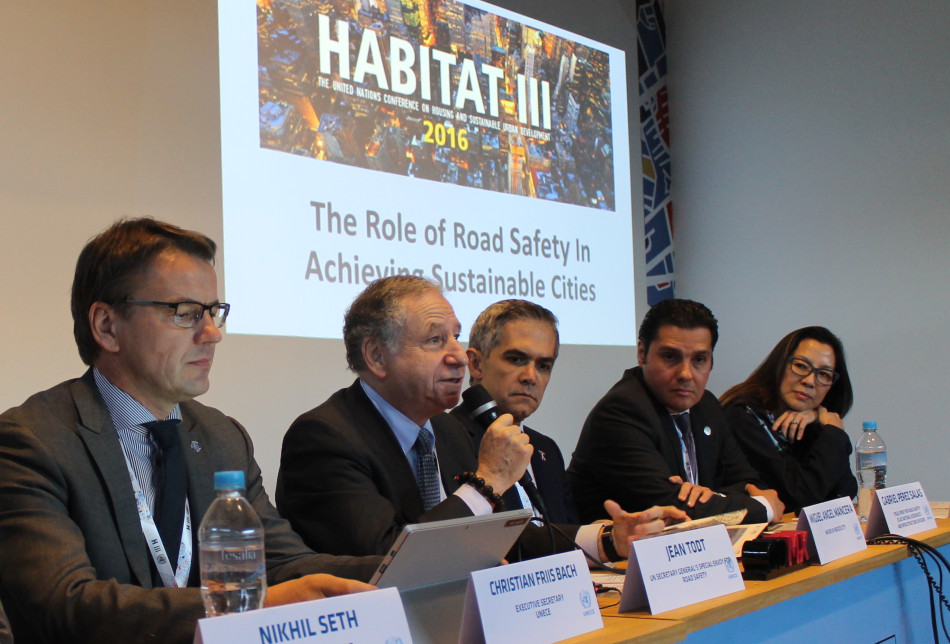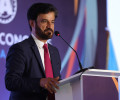The Role of Road Safety in Achieving Sustainable Cities
Jean Todt takes part in the UNECE side event at UN Habitat III in Quito

Improving road safety and reducing the number of road crashes should be part of a strategy to build sustainable cities by implementing urban planning, enforcing education policies, and offering affordable public transport; this was the conclusion of the experts gathered by the United Nations Economic Commission for Europe (UNECE) on October 18, during its side event at the UN Habitat III conference currently taking place in Quito, entitled the Role of Road Safety in Achieving Sustainable Cities.
The panelists, who highlighted the role of road safety in the New Urban Agenda, which will be adopted at the end of Habitat III, were Christian Friis Bach, Executive Secretary of the UNECE, Jean Todt, FIA President and UN Secretary General’s Special Envoy for Road Safety, Michelle Yeoh, UNDP Goodwill Ambassador, Miguel Ángel Mancera, Mayor of Mexico City, Nikhil Seth, Executive Director of the United Nations Institutes for Training and Research (UNITAR), Gabriel Pérez Salas, Associate Economic Affairs Officer in the Infrastructure Services Unit at the United Nations Economic Commission for Latin America and the Caribbean ( UN-ECLAC) and Peter White, Chief Operating Officer for the World Business Council for Sustainable Development.
“Road safety must be a key consideration when planning land use and urban areas”, said FIA President who addressed the audience in his role as UN Secretary General’s Special Envoy for Road Safety. Todt also underlined that “strategies to reach sustainability in mobility, transport and road safety must rely on reduction of the volume of traffic, investment in infrastructure for public transport and consideration of all risk factors”. He added that those responsible for designing urban mobility solutions should focus on the safety of the most vulnerable road users. Each year, road crashes result in 1.25 million fatalities and leave 50 million people injured across the world. “We need urban areas allowing children to get to their schools safely, whether they travel on foot, by public transport or motorized vehicles”, Jean Todt said.
The case of Mexico City, which has managed to reduce road deaths by 20% over a period of seven months, was used as a success story during the panel discussion. Mexico City has achieved this goal thanks to a strategy that prioritizes pedestrian safety, imposes tough sanctions on motorcyclists who don’t wear a helmet, ensures public transport operators are obeying the rules of the road, and uses speed radar to fine those who break the limits. “I think technological innovations are cheaper than the cost of deaths on the road and the collateral damage resulting from these deaths”, said Miguel Ángel Mancera, Mayor of Mexico City. Mr Mancera added that the authorities are distributing handbooks on how to cross the roads safely and on how to use cycle routes correctly.
Executive Secretary of UNECE, Christian Friis Bach, shared the relevance and importance of the UN transport conventions in addressing the greatest problems facing us in road safety. Mr. Bach explained how conventions such as the UN vehicle regulations could expecially address some regional problems in the quality of vehicles: “The same car that you see in the United States is stripped of the basic safety devices such as airbags and electronic stability control when it is made for the Latin American market. Accession and implementation of the UN vehicle regulations would prevent this.”
According to Gabriel Pérez Salas, Associate Economic Affairs Officer in the Infrastructure Services Unit at the UN-ECLAC, it is necessary to “redouble efforts to reduce road crashes by 2020 and road safety should be part of a mobility policy that integrates the elements which are infrastructure, regulation, education and enforcement”.
Peter White, Chief Operating Officer for the World Business Council for Sustainable Development, agreed that urban development and mobility should be dealt with holistically and said said “urban sustainable mobility planning should be a community driven process”.
Actress and UNDP Ambassador Michelle Yeoh was invited to share the road safety Public Service Announcement videos for the Safe Steps campaign for which she is the Road Safety Ambassador. The PSAs have reached 80 million households in the Asian region and are an example of practical tools that are available to everyone to promote road safety. Michelle Yeoh invited the audience to view them, share them and follow their advice and concluded that “while governments have the primary responsibility to improve road safety, simple steps like wearing seatbelts, or paying attention while driving, will go a long way towards saving precious lives.”

 Facebook
Facebook Twitter
Twitter






